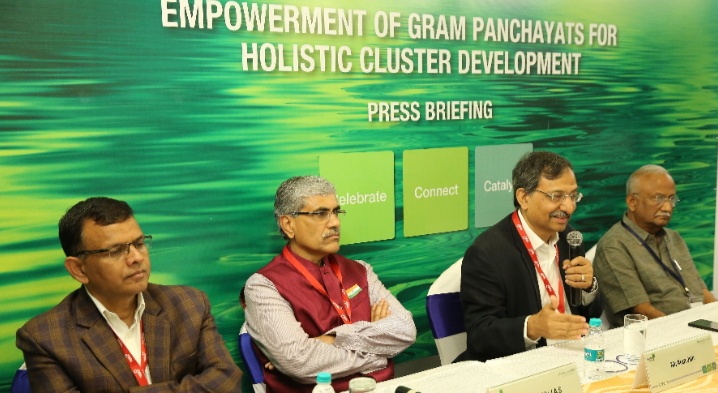- The platform will enable these grassroot organisations to connect and collaborate, thereby further accelerating the development of communities across sectors and regions in the country
- Has launched community development framework for holistic rural transformation
January 31, 2020, Chennai: Mission Samriddhi, a social impact platform working to facilitate holistic rural development in India, has brought together over 150 organisations with expertise in rural development -Development Accelerators (DAs) from across 18 States at its 8th Annual Summit in Chennai. Facilitated by Mission Samrddhi, the DAs help communities in their development journey.
Mission Samriddhi acts as a catalyst to accelerate many processes by applying the principles of Design Thinking. It supports grassroot organisations with the requisite expertise and incentives, using its Community Development Framework for holistic rural transformation. Focussed on the theme of ‘Design for Scale’, the 3-day Mission Samriddhi ‘Summit 8’ will also witness the participation of various stakeholders from the government, NGOs, panchayats, corporates and volunteers from the social sector space.
The event will see participants sharing their insights and experience in developing sustainable and scalable projects, with positive impact on the larger population. The key dignitaries attending the summit are ‘Mr. SM Vijayanand I.A.S., Former Chief Secretary, Govt. of Kerala; Dr. WR Reddy I.A.S.,Director General, NIRDPR and Mr. Siddharth Tripathy I.F.S., Commissioner Rural Development, Govt. of Jharkhand.’ Mission Samriddhi offers the benefit of collective leadership and vision of several dignitaries in exploring the roadmap for local self-government, focusing on initiatives such as India Panchayat Forum and Community Development framework.
The summit will also host the Polestar Social Impact Awards, recognition of excellence for organisations working in the social sector. Another highlight of the summit is the Sarpanch panel discussion where some of the outstanding Sarpanches from various States will share their experiences – challenges and best practices.
In his inaugural keynote, Arun Jain, Founder & Catalyst, Mission Samriddhi and CMD, Intellect Design Arena Ltd said, “Just three years ago, armed with compassion and a massive transformative purpose, Mission Samriddhi set out to learn and understand the patterns, gaps and opportunities for holistic community development in rural India. That was Mission Samriddhi 1.0. We are happy to say that we are now ready for Mission Samriddhi 2.0, where we are looking to scale up. Our purpose gets clearer and more relevant every day.”
He further added, “Mission Samriddhi has always respected the scale of the government, the sensitivity of NGOs and the agility of the corporate sector. It believes that great strides can be made in rural development only through a collaborative approach between all the stakeholders. Also, for a truly stronger economy, it is necessary to focus on villages, building their capabilities and exploring opportunities for sustainable development. Design Thinking helps to unleash the power of boundaryless thinking and plays an important role to understand the patterns, gaps and opportunities for holistic community development in rural India.”
Commenting on the empowerment of Gram Panchayats at the Summit 8, Mr. Vijayanand said “Participatory planning and volunteerism from civil society are the entry points to activate self-governance in Gram Panchayats.”
Empowerment of Gram Panchayats for Holistic Rural Development
Mission Samriddhi’s approach to rural development is based on Thinking (Design Thinking), Research, Education and Advocacy leading to Development – THREAD.
The India Panchayat Forum (IPF) launched on the occasion of the 150th birth anniversary of Mahatma Gandhi at Gandhi Ashram, Sewagram in Wardha on 2nd October, 2019, will focus on the THREAD Framework through the Cluster Development approach and thereby usher in sustainable holistic development. IPF is designed to be an independent, non-partisan, pan-India, multi-stakeholder forum to catalyse the strengthening of Panchayati Raj Institutions.
Community Development Framework for holistic development
In India today, so many Development Accelerators are working intensely for rural development and yet they do so in silos. For example, an organisation deeply focused on livelihood, may or may not observe the challenges in the same community pertaining to health or education or gender equality or social justice. There is no dearth of policies, schemes or sector-specific best practices in the country. And yet, the human mind gets intimidated and lost when information, ideas, concepts and models are not structured – leave alone being aligned. A structured framework can reduce this clutter, bring in a common vocabulary/understanding for all the stakeholders and therefore align to the one larger purpose – holistic and sustainable human development.
After 3 years of listening, observing and dialoguing with several thought leaders, institutions and experts through Design Thinking workshops in Livelihood, Agriculture, Education, Health, Local Governance and after understanding the 73rd Amendment, the RGSA, and the NCBF, Mission Samriddhi has attempted to evolve such a development framework – a development framework based on Personal, Social, Economic, Ecological and Institutional Empowerment of our Gram Panchayats.
Mission Samriddhi has already been working in clusters in Wardha, (Maharashtra), Sonbhadra and Baghpat (UP) to develop beacon community republics by applying the D1 to D7 Community Development Framework. In addition, Mission Samriddhi has partnered with the National Institute of Rural Development and Panchayat Raj (NIRDPR) to establish beacon Gram Panchayat clusters in 10 of the identified 150 – (3 in Maharashtra, 4 in Chhattisgarh and 3 in Assam), for strengthening institutional capabilities of the Gram Panchayat over the period of 3 years





